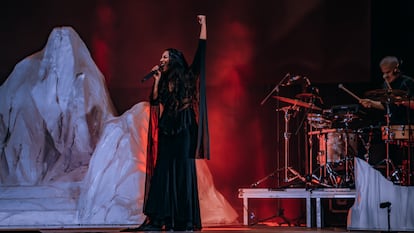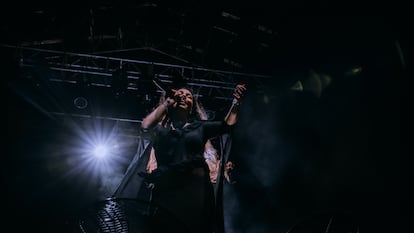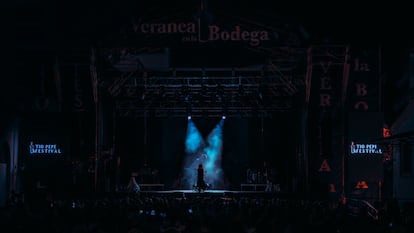It is as if this grounding had needed before flying to half Europe in autumn. María José Llergo (Pozoblanco, 31 years old), one of the flamenco voices at the service of electronics and the new rhythms with more national projection (when he won in 2020 the Goya for his song The sea awaits youfrom the movie Mediterraneanhis career exploded), he practically finished his summer season with the concert he offered this Saturday in Jerez de la Frontera (Cádiz), within the framework of Uncle Pepe Festival. The recital had a lot of smell of ancient winery (in the most literal sense of the term, the effluviums of the oldest generous wines in the country sneaked into the concert with each air streak, coming from the centenary boots of the firm González-Bayss, where it was celebrated) and of the ancestral voices with which this artist of youth still has built the foundations of his musical career.
While the electronic keyboards, synthesizers and percussion were grabbed to the present, Llergo remembered the Jerez’s pack, who was the queen of the bulería and a woman with an iron pulse that challenged the conventions of his time; of the eternal Lola Flores, who versioned an applauded Penalty, Penita, Penalty that he was inevitably forced to sing with a major of the place among the public; And even shrimp of the island – natural of the nearby city of San Fernando -, with which he said goodbye to Andalusia in an improvisation that was quickly recognized by an auditorium that came to remind his origins to this Cordoba who studied since he was a child “the entire ancient discography of Triana and Jerez,” he explained to El País, even in a state of euphoria minutes after the concert.
“There is so much flamenco on this land that it was a very big challenge, and at the same time an immense joy, to be here,” continued the artist after what has been her debut in the Cadiz city of Jerez, one of the great mecas of flamenco in the world. The public, in fact, fired it with thunderous palms for bullfighting. “That doesn’t happen in all scenarios, and it’s very magical.”
From here, he has three left cakes In Spain before leaving in November, which will be its first European tour: Paris, Mercuneter, London, Brussels, Berlin, Winthertur, Lausana … cities that a priori might seem more given to applaud its proximity to electronics, but where the Cordoba has decided to play it: it will go with a piano and its voice. “It’s much more organic, and I especially like that,” he explains. And how will these audiences welcome this flamenco naked voice, even if it approaches other music? “When someone asks me how I define my music, I like to think of this new way of defining the fluid genres, those that do not identify with one or another synths and a super electronics deepalso, why not? In the end, when composing, always send an emotion. And that is what makes it in the end to have a more electronic, more organic, more acoustic character, whatever. ”

To this new continental adventure travel Llergo – as he stressed on Saturday in Jerez – with an album, Ultrabellezathe second of his career, which is challenging the programmed obsolescence of the music industry. Published more than two years ago, it is still astonishing how it is received by the public where it is presented. “Being able to be turning more than two years with the same album is a very atypical thing today. And that fills me with joy. Because when I do a work, I do not do it thinking that it can be a success of the moment. No, I do it thinking of a legacy that I leave for the day I leave. And the fact of composing over low heat, looking very good at the details, doing it with that same time and that time last, ”reflects the artist while an agglomeration of followers waiting after the cancellation of the wineries.
Ultrabellezawho reviewed almost completely during the concert, is an album in which María José Llergo has emptied. And it has also been portrayed, in its “inevitable activism” and its feminist, social justice discourse, in favor of diversity, of defense of nature … ahead has the challenge of contributing something new in a next record work. Do you have anything to tell this Cordoba? “Much. Let’s see, I’m hypersensitive, well and bad. And I think it is a gift, because that hypersensitivity can channel it through music and songs. Every day I can tell many things: if in my day to day I open the Instagram like every neighbor’s son and cry seeing what is happening in Palestine, how am I not going to say it and how am I not going to share it? ”He asks.

Spontaneously, without knowing it, María José Llergo participates in an open debate in this newspaper about whether artists are obliged to position themselves publicly to conflicts such as the Gaza War. “In the end it is honesty. I do not say that all artists have to expose. But for me it is irremediable. It would not be me if I could not say what I feel. And I do not plan to sacrifice that freedom to succeed,” he says with a sweetness in his words and in the tone of his voice with which he drives the entire conversation.
In the background, as reminding him of his root, he is observed by a sculpture from whom he carries one of the most famous names of the Spanish wine culture: José Ángel de la Peña, Uncle Pepe of Manuel María González Ángel, founder of the Jerez wineries that made his fundamental support in the commercial brand of the most famous fine wine in the country. Llergo has an identical link with his grandfather, of the same name, to which he invokes, without exception, in each concert. A 95 -year -old farmer, without studies, who taught him to sing “while plowing the field.” “He lived the civil war being a 6 -year -old boy, his life has been very hard. And he is always in me, always, always … in many concerts we ended up chanting Pepe, Pepe, Pepe. And I record it on video and then teach it and get very excited,” he laughs and excites himself and also excites the artist when he remembers it.

